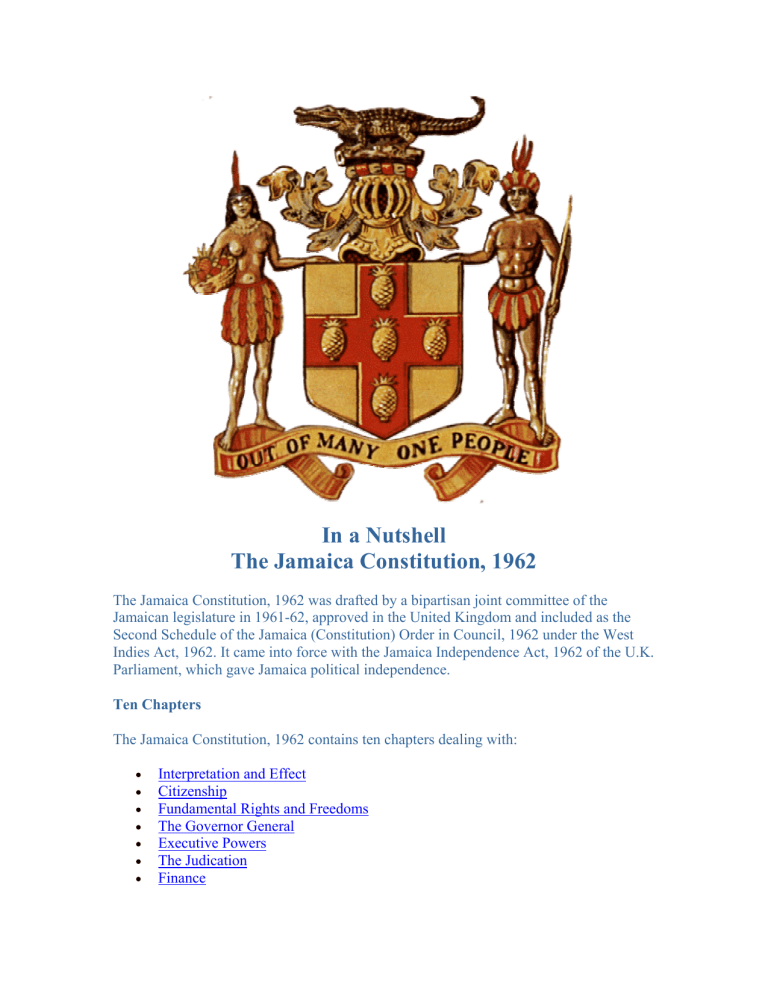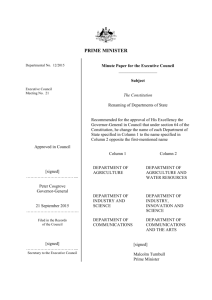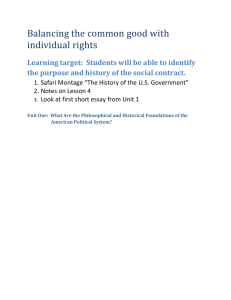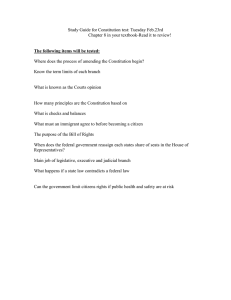
In a Nutshell The Jamaica Constitution, 1962 The Jamaica Constitution, 1962 was drafted by a bipartisan joint committee of the Jamaican legislature in 1961-62, approved in the United Kingdom and included as the Second Schedule of the Jamaica (Constitution) Order in Council, 1962 under the West Indies Act, 1962. It came into force with the Jamaica Independence Act, 1962 of the U.K. Parliament, which gave Jamaica political independence. Ten Chapters The Jamaica Constitution, 1962 contains ten chapters dealing with: • • • • • • • Interpretation and Effect Citizenship Fundamental Rights and Freedoms The Governor General Executive Powers The Judication Finance • The Public Service Interpretation and effect (Chapter 1) Chapter 1 explains the meaning of terms and ideas expressed in the Constitution and make clear that the Constitution is the supreme law of Jamaica and that all other laws are secondary to it and depend upon it. ..." If any other law is inconsistent with this Constitution, this Constitution shall prevail and the other law shall, to the extent of the inconsistency, be void" (Section 2). Citizenship (Chapter 2) Under Chapter 2 of the Constitution, persons born in Jamaica and persons born outside Jamaica of Jamaican parents have an automatic right to Jamaican citizenship. Women who have married Jamaican men and former citizens of the United Kingdom and Colonies who had become naturalized or registered as British subjects in Jamaica can also register as Jamaican citizens. Parliament is given power in the Constitution (under Section 11) to make further provision for the acquisition, deprivation and renunciation of citizenship; and the Governor-General (under Section 8) is given power to deprive of their Jamaican citizenship those Jamaican citizens who acquire citizenship or the rights of citizenship of another country. Fundamental rights and freedoms (Chapter 3) Chapter 3 provides that every person, regardless of race, place of origin, political opinions, colour, creed of sex, is entitled to certain fundamental rights and freedoms. These include right to life; the right to personal liberty; freedom of movement; freedom from inhuman treatment; enjoyment of property; freedom of conscience; freedom of association; respect for private and family life; and freedom from discrimination. The enjoyment of these rights and freedom is "subject to respect for the rights and freedoms of others and for the public interest". In the public interest, individual rights may be also suspended in a manner prescribed by the Constitution (e.g. in the event of war, calamity of threat of subversion). Any person who believes that his rights are being violated or threatened may apply to the Supreme Court (or on appeal to the Court of Appeal) for enforcement of rights and for redress. Governor-General (Chapter 4) Under Chapter 4, the Governor-General is given authority, as the representative of Her Majesty the Queen, to name the date of a general election, to appoint Ministers and assign them responsibilities to appoint Parliamentary Secretaries, the Attorney General, Senators, Privy Councilors, the Chief Justice, the President of the Court of Appeal, the Director of Public Prosecutions and members of the Services Commissions. In most cases the Governor-General acts in accordance with the advice of the Prime Minister, in some cases also after consultation with the Leader of the Opposition and in other cases in the recommendation of such authorities as the Services Commissions and the Privy Council. In only a few matters, mainly minor ones, does the Governor-General act in his own discretion. The Governor-General's formal Assent is also required for Bills of Parliament to become law. Parliament (Chapter 5) Under Chapter 5 of the Constitution, Parliament is given power to make laws for the peace, order and good government of Jamaica. Parliament consists of Her Majesty the Queen, represented by the GovernorGeneral, and two legislative Houses, a nominated Senate and an elected House of Representatives. The Governor-General opens Parliament once a year with the "The Speech" and gives the Royal Assent for each Bill, passed by the two Houses, to become law. A Bill may be introduced by any member of either House. (However, in practice most Bills are introduced in the House of Representatives). Money Bills can only be introduced in the House of Representatives. The Senate may delay money Bill for not more than one month and any other Bill for not more than seven months. The House of Representatives can end the term of office of a Government if a majority, of all its members, supports a motion of no confidence. The Senate consists of 21 members, appointed by the Governor-General, 13 nominated by the Prime Minister and eight nominated by the Leader of Opposition. Any Jamaican citizen of 21 years or over or any Commonwealth citizen 21 years or over living in Jamaica for at least one year, can become a member of either House of Parliament. Executive powers (Chapter 6) Under Chapter 6 of the Constitution, the Governor-General is required to appoint as Prime Minister the member of the House of Representatives who is best able to "command the support" of a majority of the members of that House. The Prime Minister selects the Ministers, Ministers of State and Parliamentary Secretaries to be appointed by the Governor-General. He forms the Cabinet and presides over it. The Prime Minister advises the Queen on the appointment of the GovernorGeneral. He has the power to advise the Governor-General to dissolve Parliament and to name the date of a general election at any time within the five years of the life of a Parliament. Important acts by the Governor-General are carried out on the advice of or after consultation with, the Prime Minister; and for some measures the Leader of the Opposition is also consulted. The Cabinet is responsible for the general direction and control of government. It consists of the Prime Minister and not less than 11 other Ministers (there is no maximum). All Cabinet Ministers must be members of one of the two Houses of Parliament but not more than four from Senate. Each Cabinet Minister is assigned one or more areas of responsibility (e.g. "agriculture", "health" or "housing") sometimes called portfolios. The Cabinet as a whole must account to the people through Parliament for its actions. Each Cabinet Minister is also individually responsible for the subject/subjects assigned to him/her. Cabinet Ministers are assisted by Ministers of Senate and Parliamentary Secretaries. However, the day-to-day work of each Ministry is administered and supervised by a senior civil servant called a Permanent Secretary is assisted by the staff of the Ministry who are civil servants. Other important executives are Attorney General, a political appointee chosen by the Prime Minister, who is legal adviser to the Government; and the Director of Public Prosecution, who is responsible for starting, continuing and discontinuing criminal prosecutions. The Director of Public Prosecutions is a qualified attorney-at-law. In exercising his functions, he is not subject to the direction or control of any person or authority. He cannot be removed from office except on the recommendation of a special judicial tribunal. His salary is constitutionally safeguarded. The Constitution secures the office of Leader of the Opposition. The Leader of the Opposition, appointed by the Governor-General, is the member of the House of Representatives who commands the support of a majority of those members who do not support the Government. The Leader of the Opposition must be consulted on a number of important matters such as appointments of the Chief Justice, the President of the Court of Appeal and members of the Services Commissions. The Opposition Leader nominates eight of the 21 Senators. The Judicature (Chapter 7) A network of courts, ranging from Petty sessions of the Court of Appeal, and even beyond, to the Judicial Committee of the Privy Council in London, is responsible for the administration of justice in Jamaica. The head of the judicial is the Chief Justice whose office, like that of all judges, is made secure by the Constitution. The judges' salaries and conditions of service are secured by the Constitution and judges can be removed from office on the advice of the Judicial Committee of the Privy Council in London. Any person dissatisfied with a judgement by any of the courts (except Pretty Sessions) can appeal to the Court of Appeal. Pretty Sessions are heard by judge in chambers. The Supreme Court administers both criminal and civil law. Its criminal cases are handled by Circuit Courts after committal by Resident Magistrates. The Supreme Court deals with civil actions involving negligence, breach of contract, slander, trespass, divorce, equity, guardianship of infants, and estates of lunatics. It also issues writs and summonses. There are special courts dealing with revenues, gun crimes, and traffic offenses and family matters. Judges are appointed by the Governor-General on the advice of a Judicial Service Commission, which includes among its members the Chief Justice, who is its Chairman, and the President of the Court of Appeal. The Governor-General on the advice of the Prime Minister appoints the Chief Justice and the President of the Court of Appeal, after consultation with the Leader of the Opposition. Finance (Chapter 8) Under chapter 8 of the Constitution, except where a law provides otherwise, all revenues of Jamaica are paid into a "Consolidated Fund" and then become very difficult to get out. The Constitution specifies how money may be moved out of the Consolidated Fund. The Minister of Finance must prepare a budget showing estimates of revenue and expenditure for each "financial year" (April 1-March 31). The estimates are tabled in the House of representatives and must be debated and approved by the House. Proposed expenditure is in the form of an "Appropriation Bill", which when passed becomes the Appropriation Act. The Minister of Finance may then issue "warrants" permitting payments out of the Consolidated Fund. Before the Appropriation Act is passed the House of Representatives may allow expenditure of a carry-on allowance known as a "vote on account". The Minister of Finance can authorize payment for unexpected expenditure through a Contingencies Fund. He may also get approval from the House of Representatives for additional expenditure during the financial year by introducing Supplementary Estimates. The Constitution provides for the appointment of an Auditor General who is responsible for auditing the accounts of all Government departments except his own. The audit of the Auditor General's department is carried out by the Minister of Finance. The Auditor General is subject to the direction and control of no other person or authority. His salary is secured by the Constitution and he can be removed from office only on the recommendation of a specially constituted judicial inquiry. Public Service (Chapter 9) As in the case of the Judicial Service Commission, there are a Public Service Commission and a Police Service Commission, provided under Chapter 9 of the Constitution, with the responsibility for the appointment, dismissal and disciplinary control of civil servants and police officers. The Governor-General makes appointments to the Services Commissions on the recommendation of the Prime Minister after consultation with the Leader of the Opposition. Notwithstanding the control exercised by the Services Commissions in general, Permanent Secretaries and the Financial Secretary are appointed by the GovernorGeneral acting on the recommendations of the Public Service Commission after consultation with the Prime Minister. A Permanent Secretary may be transferred by the Governor-General on the advice of the Prime Minister, and power to appoint Ambassadors, High Commissioners or other principal representatives abroad is vested in the Governor-General acting on the advice of the Prime Minister, provided that where the appointment involves a civil servant the Prime Minister must consult with the Public Service Commission. Amendment of the Constitution The Constitution lays down the procedure for its own amendment (Sections 49 and 50). In some cases, where no great basic principal is involved, the Constitution may be amended by a relatively simple process - a majority of all the members of both Houses. There have already been four amendments by this simple procedure resulting in: • Modification of the provision dealing with categories of appointments to the Judicial Service; • Commission, as a result of fusion of the legal profession; • Lowering of the voting age from 21 to 18 years; • Increases in number of Senators who could be Ministers without portfolio and in • Parliamentary Secretaries who could be appointed from the Senate, and • Eligibility of Ministers from Senate to hold portfolio responsibilities (subject to a maximum of four Ministers from the Senate). In the case of provisions considered to involve important basic principles, the provisions are "entrenched' or, in the more extreme cases, "specially entrenched". The entrenched provisions include those relating to: • Fundamental rights and freedoms; • The establishment and security of offices such as those of judges; • The Auditor General; • The Director of Public Prosecutions and of the Services Commissions; and • The arrangements for control of public finance. These "entrenched" provisions may be amended by the votes of two-thirds of all the Members of each of the two Houses of Parliament, after the amendment Bill has gone through especially long review periods in the House of Representatives. The "specially entrenched" provisions include those relating to: • The establishment and constitution Parliament; • Dissolution of Parliament and holding of general elections; • The executive authority of the Queen; and • The dominance of the Constitution itself over all other laws. Specially entrenched provisions may be amended by the same procedure as "entrenched" provisions but additionally, for their amendment, the support of the majority of those voting in a national referendum held within a specified period after passage of the amendment Bill is required. An entrenched or specially entrenched provision may be amended without the necessary majority in the Senate. This is possible in cases where the amendment gets the required approval in the House of Representatives twice in one session, is rejected by the Senate within stipulated periods, and gets the required support in a national referendum- the required support then being three-fifths of those voting to approve amendment of a specially entrenched provision. Kingston, Jamaica Reprinted August 1990






